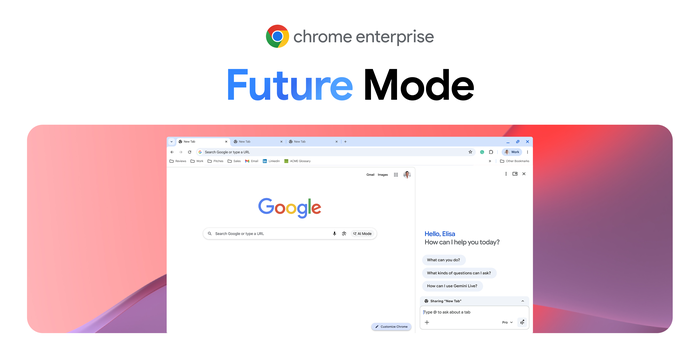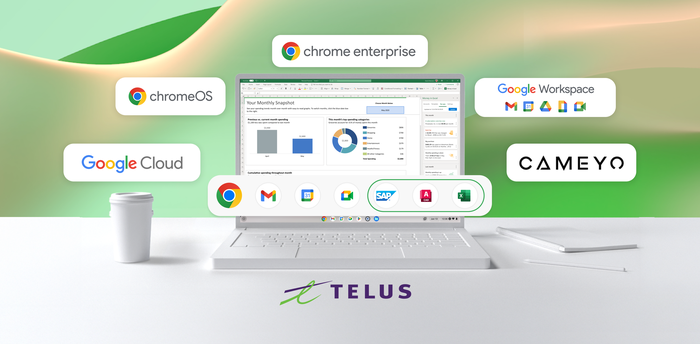Delfingen accelerates a cloud-first strategy with Google

Etienne Grivelet
Chief Technology Officer, Delfingen Group
How Delfingen drives growth with Google's end-user computing stack
Editor’s note: Today’s post is by Etienne Grivelet, Chief Technology Officer for Delfingen Group, a global supplier and manufacturer for the automotive industry. As part of its digital transformation plans, Delfingen has adopted ChromeOS, Chrome Enterprise, Google Workspace, Cameyo, and Google Cloud.
How can a global automotive product manufacturing company, with employees spread across borders, accelerate growth? At Delfingen, the answer was to become a cloud-first organization by embracing Google’s end-user computing stack. ChromeOS, Chrome Enterprise, Workspace, Google Cloud, and Cameyo together have helped us achieve this goal for our 4,000 employees across 20 countries and 37 locations.
Choosing technology that keeps pace with growth
In just five years, our company has experienced a remarkable expansion, doubling our workforce and growing by 23% through the massive acquisition of our main competitor. This expansion underscores the urgent need for standardized, manageable workplace technology.
Our IT team, relatively small for a global manufacturing company, has to be innovative and choose the right mix of tools to standardize processes and optimize our limited resources. As a first step, we created our own enterprise resource planning (ERP) solution that could be available in the local language and used by all Delfingen employees, even when IT support isn’t always available.
Our cloud-based ERP solution needed an endpoint that aligned with our cloud-first vision for modern work. This strategic choice was crucial to scale our operations globally and paving the way for a zero-trust architecture. This led us to Acer ChromeOS devices, Pixel 7a smartphones, Google Cloud Platform, Google Workspace, and Chrome Enterprise.
Security strengthened with ChromeOS
To succeed, we must protect the proprietary data of the products we manufacture. Prioritizing partners that also value security is very important to us and our customers. When we looked at our budget, a large portion was on cybersecurity. The escalating costs of security solutions like endpoint deployment detection (EDR), plus cybersecurity insurance for multiple PCs, has become a significant burden. Moreover, adding Microsoft EntraID (formerly Active Directory) for policy management was further inflating expenses by double or even triple.
ChromeOS, with automatic updates, ensures consistent protection and is secure out of the box. By eliminating these costs, we’ve significantly reduced our security expenses while improving our overall security posture. Adding in the lower cost of Chromebooks, we have significantly improved our return on investment.
The cloud-first nature of Chromebooks and Google Workspace tools like Google Docs minimize the risk of data loss in case of theft or device loss. Unlike traditional devices with local storage, Chromebooks and Google Workspace store data in the cloud. If a device is lost or stolen, we can remotely erase its data and issue a new device, enabling the user to pick up where they left off.
Building a tech stack that supports our cloud-first vision
Becoming a cloud-first company goes beyond the operating system. Our tech stack needed to be integrated and work smoothly together. With Google Cloud Platform and 1,000 ChromeOS devices as the foundation, we layered productivity apps like Google Workspace and Chrome Enterprise, the most trusted secure enterprise browser, to support our growth. And with Cameyo, we maintain access to all of our legacy applications within this modern framework.
Our layered Google solution allows us to work collaboratively and use our devices in a variety of ways, whether the devices are set to kiosk mode or simply given to individual employees. The shared devices are secured without requiring cumbersome sign-in processes or QR codes allow our collaborators to access information while protecting the company and user data. We limit the apps that users can access, and prevent people from accessing data from previous users. From the Google Admin console, we can see every device and centrally manage usage, browser policies, and device policies.
Our cloud-first solution also works together to keep the business safer. With ChromeOS and Chrome Enterprise, we can limit data loss by restricting sensitive data from being transferred off devices. Easy deployment allows us to get a new device up and running in less than 10 minutes. Our unified Google solution is simple to manage, secure, and supports the modern worker.
The sustainable choice
We previously had to replace our Windows devices every three years. However, due to the durability and extended support lifecycle of Chromebooks, we’ve extended the renewal cycle to six years. We save money and significantly minimize e-waste.
We’re also a more sustainable business. With more environmentally friendly IT, including ChromeOS and Google Workspace, Delfingen achieved our ISO 14001 certification, the internationally recognized standard for environmental management systems. We had to show that as a company, we’ve taken proactive measures to minimize our environmental footprint. IT played a very impactful role in this process, thanks to our reduction in disposable hardware—yet another benefit of choosing ChromeOS and Chrome devices. In 2022, NextGEN IT recognized our cloud-first journey with the Delfingen workstation transformation, awarding us the CTO Trophy for mid-sized companies.
Cameyo solves an app access challenge
A key requirement for any technology solution is compatibility with existing systems and employee familiarity. Cameyo and Chromebooks seamlessly integrate to ensure that our employees have access to local client-based applications like Excel. Cameyo played a crucial role in bridging the gap between legacy systems and our cloud-first goal by providing employees with a solution for their immediate needs. The introduction of cloud-based versions of these familiar apps, including a virtualized Excel, proved to be a game changer. Chromebook adoption rose from 20% to 76% just a few months after deploying Cameyo.
Realizing our cloud-first vision
Today, we don’t need servers in any Delfingen plants—an amazing accomplishment. Our transition to a cloud-centric workplace has been a resounding success with ChromeOS, Google Workspace, Google Cloud Platform, and Chrome Enterprise. They complement each other and work together to simplify management and improve security.
With 76% Chromebook adoption, employees are more connected and efficient than ever before. We won’t stop until we’re at 100%, the goal set by the CEO. I can walk around any Delfingen office or plant in any country and I’m signed in automatically with all my data and apps available to me when and where I need them. Our vision of being cloud-first is here now.



